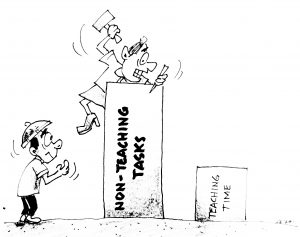Quality education is a critical determinant of a nation’s development. The Philippines, unfortunately, is consistently ranked low in global education indices, and the unavailability of adequate teaching time is among the core contributors to this trend. Since teachers in the country are often burdened with numerous tasks requiring voluminous reports, they rarely have time to evaluate each student’s learning needs thoroughly. As a result, students’ learning efficiencies decrease, which further restricts their potential and advancement.
The limited amount of quality teaching time further reduces learners’ chances of exploring and refining their critical thinking, analysis, and problem-solving abilities. Time spent copying notes from the board or completing assigned homework without proper guidance hinders students’ learning and skill development. The inability to provide meaningful learning and teaching also impacts students’ overall knowledge retention and impairs their long-term memory, which adversely affects their future academic and professional achieveAt present, the public educational system is characterized with large classes, making it difficult for teachers to give individual attention to students. A student who may require extra help with a particular skill or subject may be left behind when progress must be achieved at a uniform rate. Teachers have to focus on advancing the class as an entity rather than catering to individual learning needs. As a result, those who require extra attention don’t receive the necessary support as required.
It cannot be denied that Filipino students are deprived of the requisite amount of quality teaching time, which hinders their development and progress. This lack of teaching time limits the opportunities for skill development and affects students’ long-term ability to absorb knowledge. Resolving this problem by increasing the number of teachers and upgrading resources can go a long way in improving learning outcomes for our students. And why not provide the school heads and principals with office clerks who could do their tasks instead of delegating these to the already burdened teachers?




